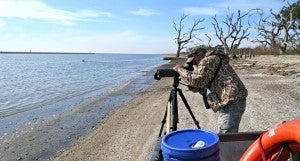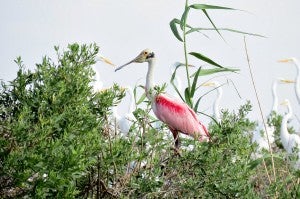5 Years Later – Birds Still Need Your Help
By Ashley Peters, Communications Associate, Audubon Louisiana
In 2010, waves of oil in the Gulf strangled and crippled the very birds that conservationists had been fighting so hard to protect, like the Brown Pelican and Piping Plover. The outpouring of support was incredible as tens of thousands of people signed up to volunteer with the National Audubon Society, all of them asking, “How can I help?”
In response to the 2010 Gulf oil disaster, the Audubon Coastal Bird Survey (ACBS) was established as a Gulf-wide citizen science survey of waterbirds and shorebirds across the impact zone and beyond. Surveys help supply scientists with better data to track population trends, and other information such as where birds go and challenges they encounter. Armed with more data, conservationists can more effectively target restoration projects, environmental policies, and other efforts to deliberately provide good outcomes for birds. And ultimately, those outcomes can help to reverse population declines.
At Audubon, volunteers have always been critical to achieving conservation goals on a scale that would not be possible with staff and scientists alone. With so many online resources, it’s easy for citizen scientists to get information about how they can get involved, to connect with other volunteers, and to report their findings online.
As the full extent of the Gulf oil disaster continues to reveal itself, we still need people asking how they can help. The Gulf oil disaster exacerbated habitat loss that Gulf shores were already experiencing, especially in Louisiana. Coastal restoration is a top priority, and ACBS helps us understand how habitat changes affect our avian friends. There are 100 million birds that nest, feed, and travel through the Mississippi River Delta each year and the delta is still an Important Bird Area. Unfortunately, it’s also still in danger due to several ongoing major ecological disasters.
There are many other citizen science initiatives such as Audubon’s Christmas Bird Count, the Great Backyard Bird Count, as well as bioblitz events, bird banding events, and much more. Please register to help with ACBS if you live near any Gulf shores, but if not, find another way to help where you live. Gulf coast resident birds were not the only ones affected in 2010; many migratory bird species were exposed to toxic chemicals as they traveled through the Gulf that spring and fall. Wherever you live, birds face an increasing number of threats and disturbances.
To get involved in Louisiana, email Louisiana@Audubon.org. To learn more about how you can help outside of Louisiana, visit Audubon.org.

